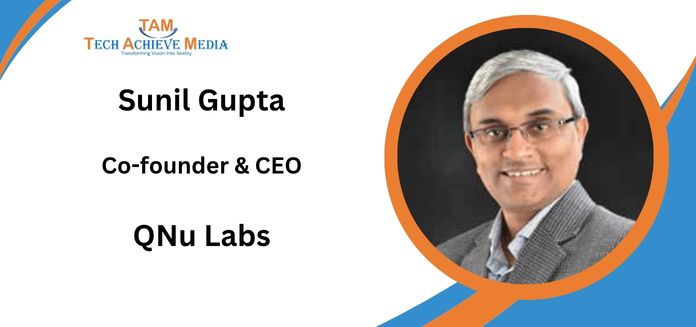QNu Labs has announced a major breakthrough with the launch of India’s first, and among the world’s longest, Quantum Key Distribution (QKD) networks. Built entirely on indigenous, patented technology, the 500-kilometre quantum-secure link spans multiple cities over existing optical fibre infrastructure. Supported under the National Quantum Mission (NQM) of the Department of Science and Technology (DST), this achievement marks a pivotal moment in India’s quest for quantum-safe communication at national scale. On the sidelines of ESTIC 2025, Sunil Gupta, Co-founder and CEO of QNu Labs, spoke to Tech Achieve Media about what this milestone means for India’s telecom ecosystem, enterprises, national security, and the road ahead toward a quantum-secure internet.
TAM: What does this achievement mean for the broader industry?
Sunil Gupta: The 150-kilometre link was point-to-point. The 500-kilometre demonstration includes trusted nodes and spans multiple cities. That’s the difference. Earlier, deployments were largely within a city, 100 to 150 kilometres. Now we have a wide-area quantum-secure network. What this milestone really signals is India’s readiness to secure any point connected by optical fibre. Like China did a few years ago, we now have the capability, and the will, to make our national optical backbone quantum-safe end-to-end. Only two or three countries in the world can claim this.
TAM: Traditionally, quantum encryption was seen as a defence-only technology. With this network, does quantum security extend to every industry?
Sunil Gupta: Communication infrastructure is owned by telcos. With this technology, telcos that operate across states can now build unified quantum-secure networks across their geographies. For example, an operator with networks in Maharashtra and Karnataka can secure both regions under a single quantum-safe layer. Banks with branches in two different cities can securely communicate over this backbone. The leap is from point-to-point to full-scale networked quantum security. With our recent partnership with BSNL, telcos can now offer quantum security as a service. That democratises access.
TAM: Will enterprises also benefit from this?
Sunil Gupta: Enterprises will buy this through telcos. Banks, hospitals, data centres, and all of them depend on telecom infrastructure. Data centres, for instance, are interconnected through fibre backbones operated by BSNL, Tata, Airtel and others. Once the telco network is quantum-ready, enterprises simply subscribe to secure communication services. They don’t need to invest in infrastructure.
That’s precisely what we are enabling.
TAM: You often credit the National Quantum Mission (NQM) for QNu Labs’ milestones. How crucial has NQM’s support been?
Sunil Gupta: NQM has been critical not just for funding, but for urgency, clarity and direction. Our milestone under NQM is 2,000 kilometres; we have completed 500. The trials we conducted with the Indian Army were possible because of NQM’s support. The mission operates with the speed and mindset of a startup; faster, in fact. They don’t want us to meet timelines; they want us to beat them. If things go as planned, we can achieve the 2,000-kilometre milestone in the next 6 to 12 months, and five years ahead of schedule.
TAM: ESTIC was started by DST to support deep-tech companies. How has the reception been for QNu Labs?
Sunil Gupta: ESTIC is a significant event because it brings together innovations across quantum, biosensors, satellites and more. What is fascinating is the progress, and how companies have delivered tangible outcomes within three to five years. India has emerged as a strong technology player in a very short time. With new funds being announced, I see the next three to five years transforming the scale of events like ESTIC, around 10x to 20x growth is very possible.
TAM: At IMC, you announced ties with STL as well. Now with the QKD network launch, what more can we expect?
Sunil Gupta: Our mission is to secure India comprehensively. What we are showcasing is the concept of Quantum Secure Coverage or QSK. Security cannot be piecemeal. It must be end-to-end across terrestrial networks, drones, free-space links, satellites and even underwater communication. We aim to protect every form of communication including wireline or wireless, on earth or in space. That’s why 60% of our spending goes into R&D. Nearly 50 people in our team work only on future technologies.
TAM: What is the long-term vision? What comes after these national-scale QKD networks?
Sunil Gupta: We are preparing for satellite QKD next. Ultimately, our mission is to build a quantum internet for India. If India can secure mobile and internet communication at the quantum layer, then we have truly arrived. Today’s networks are designed for convenience, not security. That is why hacks happen. A quantum-secure internet and quantum-safe mobility will transform the country.
TAM: Is there anything you would like to add?
Sunil Gupta: It’s a great time for India. While we are working to make India “future-safe,” it is equally important for the ecosystem to collaborate, not just in developing technology but in deploying it. Real impact comes when the technology reaches the end users. And the ecosystem is showing tremendous enthusiasm. People are coming forward proactively, even requesting to collaborate immediately. That’s how India will truly become technologically invincible.







